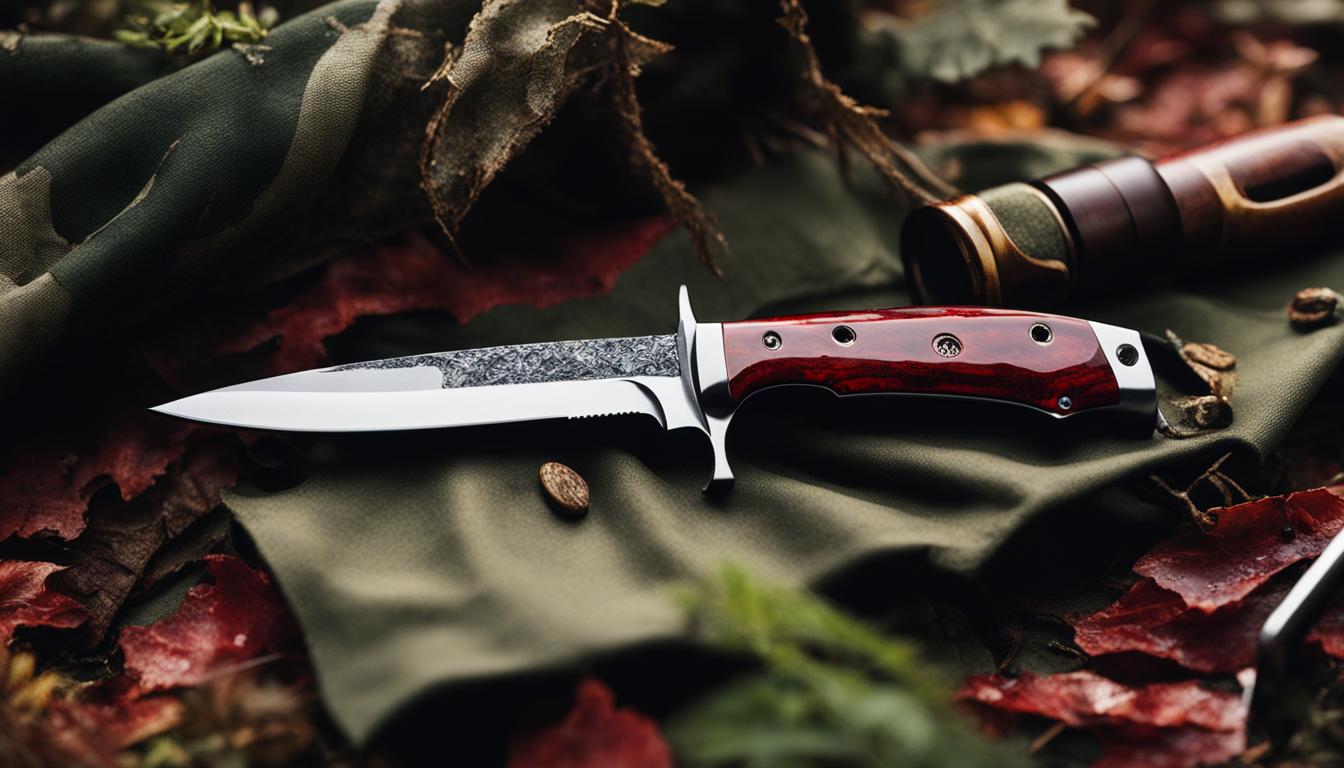When it comes to purchasing a hunting knife, it’s crucial to know and understand the laws and regulations surrounding its purchase and use. Each state has its own set of rules regarding the types of knives that are legally permitted, how they can be carried, and where they are prohibited. By familiarizing yourself with these laws, you can ensure legal compliance and avoid any unnecessary legal issues.
Before making a hunting knife purchase, it’s important to consider the specific regulations in your state. In Florida, for example, the laws vary based on the type of blade, how it’s carried, and the knife’s intended purpose. Understanding these laws will help you make an informed decision and stay on the right side of the law.
Key Takeaways:
- Each state has its own laws regarding hunting knife purchase and use.
- In Florida, pocket knives with blades under four inches are exempt from concealed carry permits.
- Fixed-blade knives can be openly carried in Florida if they are visible and not longer than four inches.
- Automatic knives and butterfly knives have their own specific regulations in Florida.
- It is crucial to familiarize yourself with the specific laws and regulations in your state before purchasing a hunting knife.
Florida Knife Laws: Understanding the Regulations
When it comes to understanding knife laws in Florida, it’s important to be aware of the specific regulations to ensure compliance and avoid any legal trouble. Florida has relatively permissive knife laws compared to other states, but there are still certain restrictions and requirements that knife owners must know. Here is a breakdown of the key regulations regarding knife laws in Florida:
Types of Knives Permitted
Florida Revised Statutes Section 790.06 outlines the types of knives that are legally permitted in the state. The following knives are allowed:
- Pocket knives with blades under four inches can be carried without a concealed carry permit.
- Fixed-blade knives can be openly carried as long as they are visible. A concealed carry permit is required if the blade is longer than four inches.
- Automatic knives, also known as switchblades, are permitted for open carry. However, concealed carry of automatic knives requires a valid permit.
- Butterfly knives, or balisong knives, are classified as folding knives and are legal in Florida. Concealed carry of butterfly knives with blades longer than four inches requires a valid permit.
Concealed Carry Laws
Florida has specific laws regarding concealed carry of knives. Here are the key points to know:
- Concealed carry of any knife with a blade longer than four inches requires a valid concealed carry permit.
- It is important to note that even with a valid concealed carry permit, there are certain places where carrying a knife is prohibited, such as schools, establishments that serve alcohol, law enforcement stations, courtrooms, and airports.
Penalties for Violations
Violation of knife laws in Florida can result in criminal charges and penalties. Carrying a knife other than a common pocket knife (with a blade less than four inches) in prohibited locations may lead to a third-degree felony charge, punishable by up to five years in jail. It is crucial to familiarize yourself with the specific prohibited carry locations to avoid any legal consequences.
By understanding and adhering to the knife laws in Florida, individuals can ensure legal compliance and avoid potential legal issues. It is always recommended to consult the specific statutes and regulations in Florida and seek legal advice if needed.
Understanding Open Carry and Concealed Carry Laws
When it comes to carrying knives, it’s essential to understand the distinction between open carry and concealed carry, as the laws surrounding each can vary. Here’s what you need to know about open carry and concealed carry laws in Florida:
Open Carry Knife Laws in Florida
Open carry refers to carrying a knife openly in public, where the knife is visible to others. In Florida, open carry of any type of knife, including hunting knives, military-style knives, and swords, is permitted, except for ballistic knives. This means you can openly carry your hunting knife without any specific restrictions or permits.
Concealed Carry Knife Laws in Florida
Concealed carry, on the other hand, refers to carrying a knife in a hidden manner, where it is not readily visible. In Florida, concealed carry of any knife with a blade longer than four inches requires a valid concealed carry permit. This means that if you wish to carry your hunting knife concealed, you must obtain a concealed carry permit to do so legally.
It is important to note that even with a valid concealed carry permit, there are certain places where carrying a knife, whether openly or concealed, is prohibited in Florida. These include schools, school buses, school-sponsored events, establishments that serve alcohol, law enforcement stations, courtrooms, airports, and more. Familiarize yourself with the specific prohibited locations to avoid any legal issues.

By understanding the open carry and concealed carry laws in Florida, you can ensure that you are carrying your hunting knife in accordance with the law. Remember to always comply with the specific regulations and take necessary precautions to avoid any legal consequences.
Requirements for Concealed Carry Permits
In order to legally carry a concealed knife with a blade longer than four inches in Florida, individuals must obtain a concealed carry permit. Obtaining this permit involves meeting certain requirements and following the application process outlined by the state. Here are the key requirements for obtaining a concealed carry permit in Florida:
- Valid Identification: Applicants must provide a driver’s license or valid state-issued photo ID as proof of identity.
- Firearms Training Course: Completion of a firearms training course may be required in some counties. This course often covers topics such as firearm safety, marksmanship, and the laws surrounding concealed carry.
- Photo and Fingerprints: Applicants will need to have their photo taken and provide fingerprints as part of the application process. This helps ensure accurate identification.
- Psychological Exam: Some counties may require applicants to undergo a psychological exam to assess their moral character and judgment. This additional step helps determine an individual’s suitability for a concealed carry permit.
- Scheduling an Appointment: Applicants can schedule an appointment for a concealed carry permit at any tax collections office or FDACS regional office. It is recommended to check the specific requirements and procedures for the county in which you reside.
It’s important to note that certain individuals may be exempt from the permitting requirements. Members of the U.S. Armed Forces and military veterans with an honorable discharge, for example, are often eligible for exemptions. Additionally, minors are prohibited from carrying any knife other than a pocket knife without parental permission. Providing a knife to a minor without proper authorization may lead to misdemeanor charges.
Table: Concealed Carry Permit Requirements in Florida
| Requirement | Details |
|---|---|
| Valid Identification | Driver’s license or valid state-issued photo ID |
| Firearms Training Course | Completion may be required in some counties |
| Photo and Fingerprints | Applicants must have their photo taken and provide fingerprints |
| Psychological Exam | May be required to assess moral character and judgment |
| Scheduling an Appointment | Can be done at a tax collections office or FDACS regional office |


It’s important to familiarize yourself with the specific concealed carry permit requirements in your county and state. Consulting a criminal defense attorney can provide valuable guidance and ensure that you meet all the necessary criteria for obtaining a concealed carry permit in Florida.
Understanding Automatic and Butterfly Knife Laws
In Florida, there are specific laws that govern the possession and carry of automatic knives, commonly known as switchblades, and butterfly knives, also known as balisong knives. It is important to understand these laws to ensure compliance with the regulations. Let’s take a closer look at the laws surrounding automatic and butterfly knives in Florida.
Automatic Knife Laws
Automatic knives are permitted in Florida, except for ballistic knives. Ballistic knives have blades that completely detach from the handle. Open carry of automatic knives is allowed in Florida, meaning they can be carried openly and visibly. However, concealed carry of automatic knives requires a valid permit. It is essential to note the distinction between open carry and concealed carry when it comes to automatic knives in Florida.
Butterfly Knife Laws
Butterfly knives, also referred to as balisong knives, are legal to possess and carry in Florida. However, if a butterfly knife has a blade longer than four inches, a valid concealed carry permit is required to carry it in a concealed manner. This means that if you intend to carry a butterfly knife with a blade longer than four inches, you must obtain the necessary permit to comply with the law.
Understanding the specific laws surrounding automatic and butterfly knives in Florida is crucial to avoid any legal issues. It is essential to familiarize yourself with the definitions and requirements outlined by the state to ensure compliance with the regulations.
| Type of Knife | Open Carry | Concealed Carry |
|---|---|---|
| Automatic Knife | Allowed | Permit required |
| Butterfly Knife | Allowed | Permit required for blades longer than four inches |
“Understanding the specific laws and definitions surrounding automatic and butterfly knives in Florida is crucial to ensure compliance and avoid any legal issues.”
Prohibited Carry Locations and Penalties for Violations
While it’s important to understand the laws surrounding knife carry in Florida, it’s equally crucial to be aware of the specific locations where carrying a knife is prohibited. Violating these restrictions can result in severe penalties. Here are some of the prohibited carry locations in Florida:
- Schools, school buses, and school-sponsored events: Carrying a knife in these locations is strictly prohibited to ensure the safety of students.
- Establishments that serve alcohol: It is illegal to carry a knife in places where alcohol is served, as it can potentially lead to dangerous situations.
- Law enforcement stations, prisons, and jails: Carrying a knife in these high-security areas poses a significant risk and is strictly forbidden.
- Government meetings: To maintain order and security, carrying a knife is prohibited during government meetings.
- Polling places: Carrying a knife within polling places can raise concerns about voter intimidation.
- Courthouses and courtrooms: To ensure the integrity of court proceedings, knives are not allowed in courthouses or courtrooms.
- Inside airport passenger terminals: For the safety of travelers, carrying a knife in airport passenger terminals is strictly prohibited.
It is important to note that carrying a knife other than a common pocket knife (with a blade less than four inches) in a prohibited location may result in a third-degree felony charge. The penalties for violating knife carry laws in Florida can include imprisonment for up to five years. Therefore, it is crucial to familiarize yourself with the specific prohibited carry locations in Florida and abide by the law to avoid any legal consequences.
Penalties for Knife Law Violations
Florida takes knife law violations seriously, and individuals found in violation of these laws may face significant penalties. Here are some of the potential consequences for violating knife carry laws:
| Violation | Potential Penalties |
|---|---|
| Carrying a prohibited knife in a prohibited location | Third-degree felony charge and imprisonment for up to five years |
| Carrying a concealed knife without a valid permit | Misdemeanor charge and fines up to $1,000 |
| Using a knife during the commission of a crime | Enhanced penalties and potentially elevated charges depending on the nature and severity of the crime |
It is essential to understand and adhere to Florida’s knife carry laws to avoid legal troubles. If you find yourself facing potential violations or charges related to knife carry, it is advisable to seek legal assistance from a qualified criminal defense attorney. They can provide you with the necessary guidance and representation to help navigate the legal process and protect your rights.
Importance of Seeking Legal Assistance
When it comes to navigating the intricacies of knife laws, seeking legal assistance is of utmost importance. Dealing with weapon charges and potential legal issues can be complex and overwhelming, but with the help of a criminal defense attorney, you can ensure that your rights are protected and your case is handled professionally.
An experienced attorney will have in-depth knowledge of Florida’s knife laws and can provide valuable guidance specific to your situation. They can help you understand the charges against you, advise you on the best course of action, and work towards achieving the most favorable outcome in your case.
The Denson Firm, for example, is a trusted law firm with decades of combined experience defending clients against weapons charges in Florida. Their team of skilled attorneys can provide expert representation from the time of your arrest through court hearings, arraignment, and trial, ensuring that you have the best possible defense.
“Having an experienced criminal defense attorney by your side ensures that you have a knowledgeable advocate during the legal process. They can navigate the complexities of knife laws, challenge any evidence against you, and make sure your rights are protected at every step.”
Weapon charges in Florida can carry serious consequences, including fines, probation, and even imprisonment. By seeking legal assistance, you can have peace of mind knowing that you have a dedicated professional working on your behalf to achieve the best possible outcome in your case.
Conclusion
Understanding hunting knife purchase laws is essential to ensure legal compliance and avoid any potential legal issues. Each state, including Florida, has its own specific regulations regarding the types of knives that are permitted, how they can be carried, and where carrying them is prohibited.
By familiarizing yourself with these laws, you can confidently navigate the world of hunting knife purchase laws and ensure that you are within the bounds of the law. It is crucial to consult the specific statutes and regulations in your state before purchasing or carrying a hunting knife to ensure that you are in compliance.
If you have any concerns or questions about knife laws, it is always advisable to seek legal assistance. A skilled criminal defense attorney who understands the nuances of knife laws can provide guidance on your specific situation and work towards ensuring the best possible outcome in your case. Remember, legal compliance is key when it comes to the purchase and possession of hunting knives.
FAQ
Are pocket knives legal to carry in Florida without a concealed carry permit?
Yes, pocket knives with blades under four inches are exempt from the requirement for concealed carry permits in Florida.
Can fixed-blade knives be carried openly in Florida?
Yes, fixed-blade knives can be openly carried in Florida as long as they are visible and not longer than four inches. If the blade is longer than four inches, a permit for concealed carry is required.
Are automatic knives legal to carry in Florida?
Yes, automatic knives, or switchblades, are legal to carry openly in Florida. However, concealed carry of automatic knives is only allowed with a valid permit.
Are butterfly knives legal in Florida?
Yes, butterfly knives, also known as balisong knives, are legal in Florida. However, concealed carry of butterfly knives with blades longer than four inches requires a valid permit.
What are the requirements for obtaining a concealed carry permit in Florida?
To obtain a concealed carry permit in Florida, you need to bring a driver’s license or valid state-issued photo ID, complete a firearms training course if applicable, have your photo and fingerprints taken, and schedule an appointment at a tax collections office or FDACS regional office.
Where are carrying knives prohibited in Florida?
Carrying knives, whether openly or concealed, is prohibited in locations such as schools, school buses, establishments that serve alcohol, law enforcement stations, courtrooms, airports, and more.
Why is seeking legal assistance important when facing weapon charges?
Seeking legal assistance is important when facing weapon charges because an experienced criminal defense attorney can provide guidance on your specific situation, advise you on the best course of action, and work towards getting your charges dismissed or reduced.
What are the hunting knife purchase laws I need to follow?
It is important to understand the specific hunting knife purchase laws in your state, including regulations on the types of knives that are permitted, how they can be carried, and where carrying them is prohibited.





